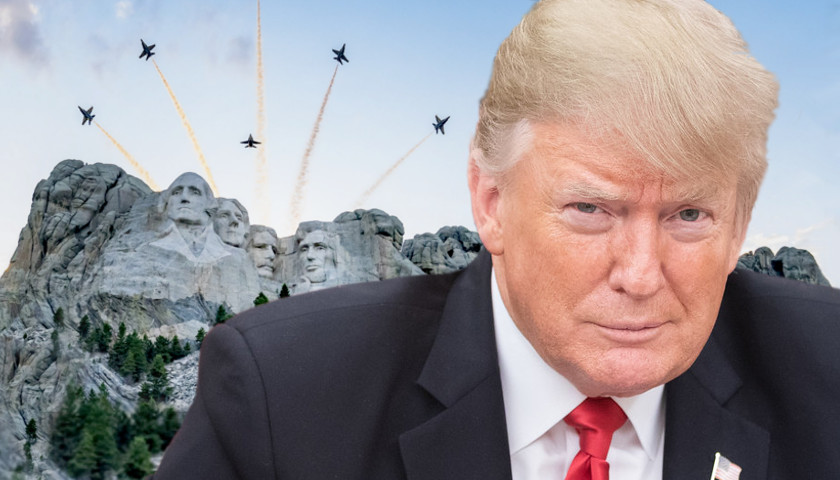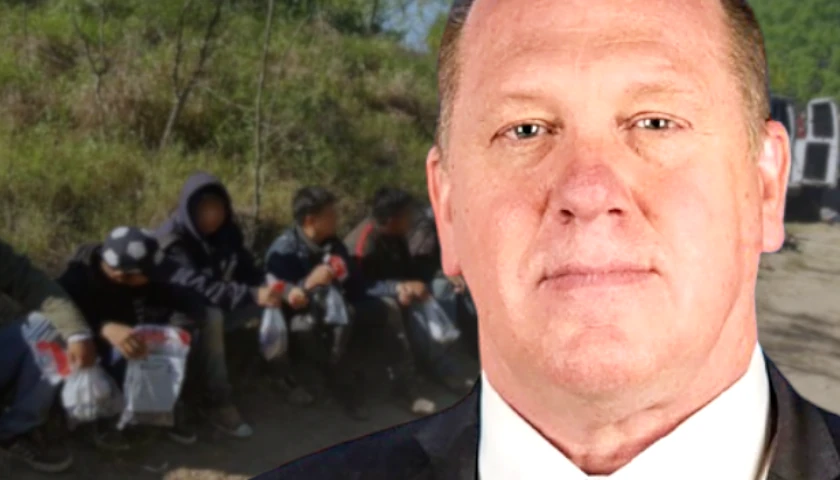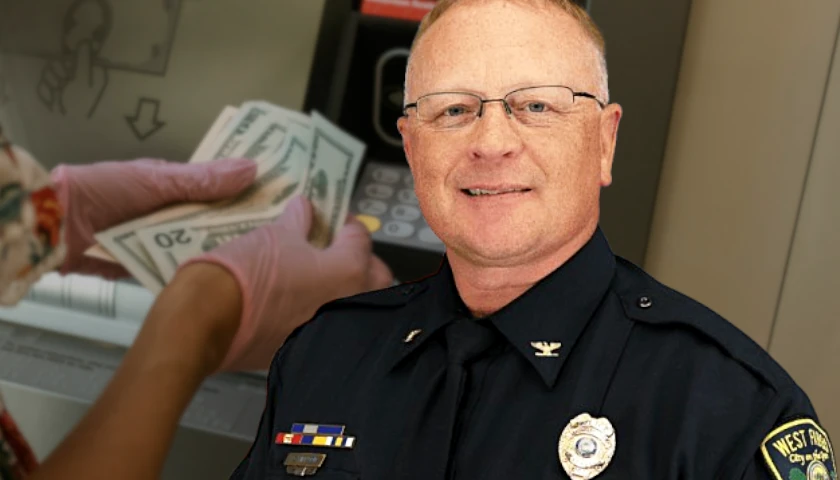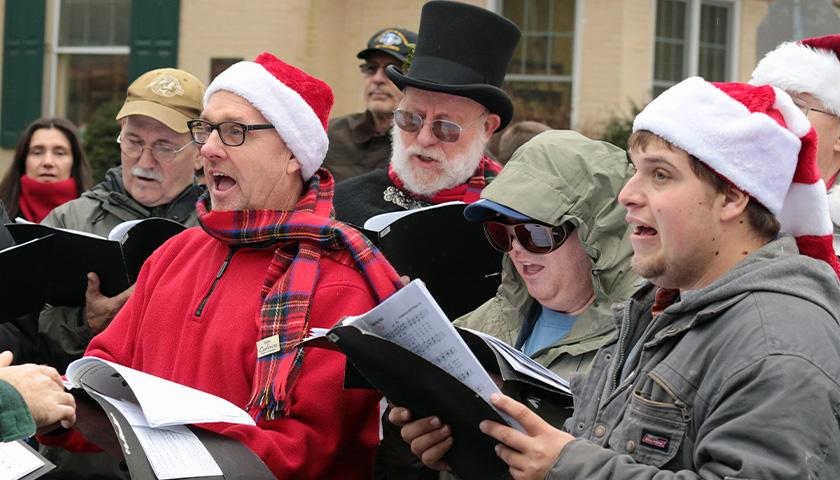by Roger Kimball
Donald Trump did not mention Lincoln’s First Inaugural address in his speech commemorating the spirit of American Independence at Mount Rushmore on Friday night. But the president’s speech—perhaps his most forceful and eloquent to date—vibrated with the same energy and existential commitment that fired Lincoln in March 1861.
Lincoln came to office at a time of crisis. His election had precipitated the secession of seven Southern states. His inaugural address was both a plea for conciliation and unity as well as a warning that violence would be stopped with force. “We are not enemies, but friends,” Lincoln said.
Though passion may have strained it must not break our bonds of affection. The mystic chords of memory, stretching from every battlefield and patriot grave to every living heart and hearthstone all over this broad land, will yet swell the chorus of the Union, when again touched, as surely they will be, by the better angels of our nature.
Donald Trump issued a kindred invitation to unity in the midst of conflict. The signing of the Declaration of Independence in Philadelphia in July 1776 was a world-historical event. It represented, the president rightly said, “the culmination of thousands of years of Western Civilization—and the triumph not only of spirit, but of wisdom, philosophy, and reason.” At the center of the triumph was the animating possession of liberty, made possible by the unanimous affirmation of the principles Thomas Jefferson articulated in the Declaration: “We hold these truths to be self-evident, that all men are created equal, that they are endowed by their Creator with certain unalienable Rights . . .”
The president’s speech was a passionate celebration of American freedom and American greatness—a greatness, he noted, that was embodied by the sublime majesty of the heads of Washington, Jefferson, Lincoln, and Teddy Roosevelt sculpted into the granite pinnacle of Mt. Rushmore.
But just as Lincoln spoke on the eve of civil war, so Donald Trump spoke in the midst of widespread and organized violence against the emblems and the spirit of the American promise. “[T]here is,” he warned, “a growing danger that threatens every blessing our ancestors fought, struggled, and bled to secure.”
Our nation is witnessing a merciless campaign to wipe out our history, defame our heroes, erase our values, and indoctrinate our children. Angry mobs are trying to tear down statues of our founders, deface our most sacred memorials, and unleash a wave of violent crime in our cities. Many of these people have no idea why they are doing this, but some know exactly what they are doing. They think the American people are weak and soft and submissive. But no, the American people are strong and proud, and they will not allow our country, and all of its values, history, and culture, to be taken from them.
I might just say “Amen!” and be done with it. But the president was not content with generalities. He sees deeply into the nature and the source of the forces besieging our country, and he is refreshingly forthright and specific about describing the malady and outlining his intended response.
The president was especially strong in challenging what is perhaps the most obnoxious manifestation of our petulant antinomianism—that species of politically correct intolerance that has come to be called “cancel culture.” In essence, cancel culture is the malignant inversion of liberalism’s defining virtues, openness and tolerance. It is born of historical ignorance and a stunning lack of empathy—an ironic fact, since one of the chief premises of cancel culture is its own supposed superior sensitivity.
In fact, the emotional payload of cancel culture is not more sensitive than its accommodating alternative, just more narcissistic. It operates by proxy, filing claims for redress on behalf of a ghostly population of abstractions: “indigenous peoples,” slaves of yesteryear, and on and on in an endless litany of complaint.
What is not at all abstract, however, are the effects of cancel culture. As the president noted, it is wielded as a weapon, “driving people from their jobs, shaming dissenters, and demanding total submission from anyone who disagrees.” In a word, cancel culture is “the very definition of totalitarianism” and is “completely alien to our culture and our values.” It should have “absolutely no place in the United States of America.” And here is where his speech took on a steely seriousness. “This attack on our liberty must be stopped,” he said, “and it will be stopped.”
In short, the president has promised to cancel cancel culture. Is that a contradiction, a violation of the spirit of tolerance he has promised to uphold? No.
The enemies of civilization routinely use and abuse its freedoms in order to destroy it. Candid men understand this and act to prevent it. As G. K. Chesterton put it, “There is a thought that stops thought. That is the only thought that ought to be stopped.”
The alarming thing about the spirit of cancel culture, and the thing that makes its violence and intolerance different from similar interdictions in the 1960s and 1970s, is that the toxin of woke intolerance has insinuated itself deeply into the tissues of our society, not just the universities—petri dishes for all sort of malevolence—but even grade schools. It has infected not just the coddled elite that, safely insulated itself, has always loved playing at radicalism, but also mainstream corporate culture. The president accurately diagnosed the extent of the malady and its true goal:
In our schools, our newsrooms—even our corporate boardrooms—there is a new far-left fascism that demands absolute allegiance. If you do not speak its language, perform its rituals, recite its mantras, and follow its commandments, then you will be censored, banished, blacklisted, persecuted and punished. Make no mistake: this left-wing Cultural Revolution is designed to overthrow the American Revolution. In so doing, they would destroy the very civilization that rescued billions from poverty, disease, violence and hunger, and that lifted humanity to new heights of achievement, discovery, and progress.
Remember this the next time you see a mob come for a statue of Christopher Columbus or George Washington or Teddy Roosevelt, or, indeed, of Robert E. Lee. What they are coming for is our history—who we are.
The Left, the president rightly noted, are “determined to tear down every statue, symbol, and memory of our national heritage.” And just as Lincoln warned that violence would be met with force, so Donald Trump put the world on notice that he means business. “I am deploying federal law enforcement,” he noted, “to protect our monuments, arrest the rioters, and prosecute offenders to the fullest extent of the law. I am pleased to report that yesterday, federal agents arrested the suspected ringleader of the attack on the statue of Andrew Jackson in Washington, D.C.—and hundreds more have been arrested.” The penalty for many of these destructive anarchist acts is 10 years in prison. Making an example of some of these miscreants will have a clarifying effect, not unlike that ascribed by Dr. Johnson to the prospect of hanging in a fortnight.
The Mt. Rushmore speech was so good because it spoke half-forgotten home truths in an atmosphere of excited confusion and discontentment.
We know that all of our most pathological cities have been run as Democratic monopolies for decades. Donald Trump had the temerity to point this out. We know that our public schools are increasingly factories of left-wing, anti-American indoctrination. The president had the temerity to point that out as well. The narrative is that Trump is a crude and bumbling ignoramus, but can you imagine Joe Biden or any other Democrat in office today having the moral courage and clarity of mind to say this:
The violent mayhem we have seen in the streets of cities run by liberals, is the predictable result of years of extreme indoctrination and bias in education, journalism and other cultural institutions. Against every law of society and nature, our children are taught in school to hate their own country—and to believe that the men and women who built it, were not heroes, but villains. The radicals’ view of American History is a web of lies—all perspective is removed, every virtue is obscured, every motive is twisted, every fact is distorted, and every flaw is magnified until the history is purged and the record is disfigured beyond all recognition.
There were many other great moments in the Mt. Rushmore speech. I especially liked what the president had to say about that popular tool of moral blackmail, “social justice.”
“The radical ideology attacking our country advances under the banner of Social Justice,” he said. “But in truth, it would demolish both justice and society. It would transform justice into an instrument of division and vengeance, and it would turn our free and inclusive society into a place of repression, domination, and exclusion.” That is as good as anything Friedrich Hayek said about that portmanteau instrument of intimidation and meritless virtue signaling.
I also liked what he said about our government’s first obligation—“to care for its own citizens first”—what he said about free speech—“We want free and open debate, not speech codes or cancel culture”—and what he said about law enforcement and the second amendment—eager support for both.
Finally, I liked what he said about equality.
“We believe in equal opportunity, equal justice, and equal treatment for citizens of every race, background, religion, and creed. Every child, of every color—born and unborn—is made in the holy image of God.” Again, can you imagine any Democrat saying that—any of it? It has often been pointed out that black lives do not matter to the Black Lives Matter movement, which is really just a gigantic machine for hoovering up money from left-wing donors and despoiling the institutions and emblems of our civilization.
It is a sad irony indeed that Black Lives Matter is explicitly dedicated to the destruction of the nuclear family—it’s part of their mission statement—since the ruination of the black family, actively abetted by the Democrats’ welfare policies, is largely responsible for the continuing plight of black Americans.
The gospel of the radicals assailing our society today is a gospel of self-abasement. The president preaches a different message: “We stand tall, we stand proud—and we only kneel to Almighty God.”
Colin Kaepernick was unavailable for comment.
Looking back on the 2020 election, historians will say that last night’s speech was the moment that Donald Trump won reelection. It was a magnificent speech that will, I predict, take an honored place in the library of great American political addresses.
– – –
Roger Kimball is editor and publisher of The New Criterion and the president and publisher of Encounter Books. He is the author and editor of many books, including The Fortunes of Permanence: Culture and Anarchy in an Age of Amnesia (St. Augustine’s Press), The Rape of the Masters (Encounter), Lives of the Mind: The Use and Abuse of Intelligence from Hegel to Wodehouse (Ivan R. Dee), and Art’s Prospect: The Challenge of Tradition in an Age of Celebrity (Ivan R. Dee).
Photo “Independence Day at Mount Rushmore” by Dan Scavino.





